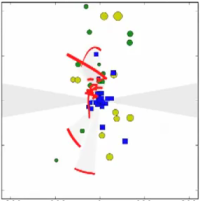More problems for Dark Matter

A new study by astronomers has found a vast structure of satellite galaxies and star clusters aligned perpendicular to the Milky Way and extending outward above and below the galaxy’s nucleus by as much as a million light years.
In their effort to understand exactly what surrounds our Galaxy, the scientists used a range of sources from twentieth century photographic plates to images from the robotic telescope of the Sloan Deep Sky Survey. Using all these data they assembled a picture that includes bright ‘classical’ satellite galaxies, more recently detected fainter satellites and the younger globular clusters.
“Once we had completed our analysis, a new picture of our cosmic neighbourhood emerged”, says Pawlowski. The astronomers found that all the different objects are distributed in a plane at right angles to the galactic disk. The newly-discovered structure is huge, extending from as close as 33,000 light years to as far away as one million light years from the centre of the Galaxy.
An animation illustrating this galactic distribution is posted below the fold. You can read the actual preprint paper here.
The problem with this polar alignment with the Milky Way’s core is that the theories for explaining the distribution of dark matter do not predict it.
“In the standard theories, the satellite galaxies would have formed as individual objects before being captured by the Milky Way”, explains Kroupa. “As they would have come from many directions, it is next to impossible for them to end up distributed in such a thin plane structure. … Our model appears to rule out the presence of dark matter in the universe, threatening a central pillar of current cosmological theory. We see this as the beginning of a paradigm shift, one that will ultimately lead us to a new understanding of the universe we inhabit.” [emphasis mine]
One explanation proposed for the polar alignment is that it is the leftover remains of a gargantuan collision of the Milky Way with another galaxy about 11 billion years ago. Unfortunately this contradicts the various models for dark matter, which once again say that the distribution of satellite galaxies and clusters surrounding the Milky Way should not be aligned, but distributed evenly in all directions.
Do these results disprove the existence of dark matter? No. There still remains solid evidence from many researchers that the objects in the outer disks of galaxies orbit their galaxies at much greater velocities than expected for the amount of matter observed. Something is causing the objects in the outer regions of galaxies to move so fast. We just don’t know yet what that something is.
What we have here is a superb example of the best kind of scientific mystery. Observational data from various and different sources has produced a paradox that cannot yet be explained. One set of data says “A” explains all. The other set of data says “B” explains all. “A” and “B” however cannot co-exist.
And ain’t that cool?
On Christmas Eve 1968 three Americans became the first humans to visit another world. What they did to celebrate was unexpected and profound, and will be remembered throughout all human history. Genesis: the Story of Apollo 8, Robert Zimmerman's classic history of humanity's first journey to another world, tells that story, and it is now available as both an ebook and an audiobook, both with a foreword by Valerie Anders and a new introduction by Robert Zimmerman.
The ebook is available everywhere for $5.99 (before discount) at amazon, or direct from my ebook publisher, ebookit. If you buy it from ebookit you don't support the big tech companies and the author gets a bigger cut much sooner.
The audiobook is also available at all these vendors, and is also free with a 30-day trial membership to Audible.
"Not simply about one mission, [Genesis] is also the history of America's quest for the moon... Zimmerman has done a masterful job of tying disparate events together into a solid account of one of America's greatest human triumphs."--San Antonio Express-News


Readers: the rules for commenting!
No registration is required. I welcome all opinions, even those that strongly criticize my commentary.
However, name-calling and obscenities will not be tolerated. First time offenders who are new to the site will be warned. Second time offenders or first time offenders who have been here awhile will be suspended for a week. After that, I will ban you. Period.
Note also that first time commenters as well as any comment with more than one link will be placed in moderation for my approval. Be patient, I will get to it.